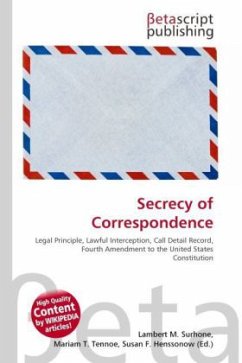High Quality Content by WIKIPEDIA articles! The secrecy of correspondence, or literally translated as secrecy of letters, is a fundamental legal principle enshrined in the constitutions of several European countries. It guarantees that the content of sealed letters is never revealed and letters in transit are not opened by government officials or any other third party. It is thus the main legal basis for the assumption of privacy of correspondence. The principle has been naturally extended to other forms of communication, including telephony and electronic communications on the Internet as the constitutional guarantees are generally thought to cover also these forms of communication. However, national telecommunications privacy laws may allow lawful interception, i.e. wiretapping and monitoring of electronic communications in cases of suspicion of crime. Paper letters have in most jurisdictions remained outside the legal scope of law enforcement surveillance, even in cases of "reasonable searches and seizures".
Bitte wählen Sie Ihr Anliegen aus.
Rechnungen
Retourenschein anfordern
Bestellstatus
Storno








